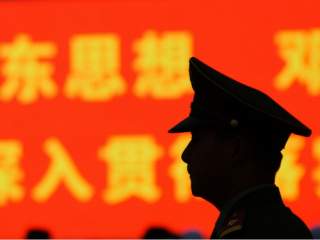Why Xi is Purging the Chinese Military
China's president pulls a page from Mao's little red playbook.
Xi’s new, self-appointed direct involvement moves him one step closer to acquiring Mao’s unfettered access to and influence over the PLA. Because the CMC Chairman Responsibility System and the PLA’s organizational reforms abolished the PLA’s four general departments, this means that the CMC now has direct control over the PLA’s top commanders, making resistance to Xi’s directives, or perhaps even feigned compliance, more of a challenge. In addition, the system will include a new disciplinary committee charged with monitoring and punishing corrupt PLA officials.
Implications
Xi’s tactics for handling the PLA, which echo Mao in certain respects, could have several significant consequences. First, Xi’s approach is not without its risks. The intense pressure wrought from Xi’s anticorruption campaign could foment rising dissatisfaction with and opposition to Xi’s leadership. Last month, for example, disaffected Communist Party members reportedly penned an open letter to Xi calling for his resignation. It was published briefly online and then removed by authorities. Hostility toward Xi’s style of rule seems real, and some observers have speculated that in an extreme but highly unlikely event, Xi might even become the victim of a coup attempt. After all, it was Mao’s defense minister Lin Biao who allegedly considered removing Mao because of the dire conditions created by the ideological witch hunt of the day—the Cultural Revolution. It would be extremely difficult, however, to muster enough credible opposition to Xi given his robust monitoring of corruption and disloyalty in the PLA ranks. Even if a coup is far-fetched, however, tensions could rise between the PLA and Xi in the coming years if officers perceive that his approach to the military is aggressive and high-handed.
It will also be instructive to see how Xi’s reassertion of paramount leader-type power over the PLA plays out for his successor. The general trend after Deng had been to increasingly leave the PLA to its own devices. Jiang ordered the PLA to get out of business and focus on improving its professionalism and combat capabilities, but by the time the torch had passed to Hu, he had very little leverage over the military and had to find ways to work with senior military officials that were mutually beneficial in nature. Like Jiang, Hu lacked any military experience and did not have anything approaching the stature of Mao and Deng, who were vaunted communist revolutionaries. This made his time as China’s commander-in-chief exceptionally challenging.
The trend has certainly reversed under Xi, but will more personalized control over the PLA continue after him? The critical factor in answering this question may be whether Xi’s successor is the scion of a well-respected communist revolutionary or otherwise possesses ties to the PLA. Xi is the son of a former revolutionary and served briefly in a secretarial position for a top CMC official. It is difficult to imagine that a future leader would have such personal control over the military without connections to it or the PRC’s revolutionary past.
Another important question that we can probably put to rest, at least for now, is whether the PLA is a rogue actor in the Chinese system. Clearly, the military is more closely managed under Xi than at any time since Mao. And now that the general departments have been reconstituted and placed directly under the CMC, commanders may have to respond directly to a new joint staff or even the CMC itself. On its face, this new chain of command might be a hindrance to decisionmaking downrange, whether pertaining to the South China Sea, Taiwan or elsewhere. To be sure, Xi’s new war zone commands—announced as part of the sweeping military reforms—are supposed to empower, not limit, commanders to make critical decisions. We will have to wait and see how this dynamic progresses.
Finally, despite some speculation to the contrary, Xi’s assertion of control over the military is unlikely to negatively impact the PLA’s ongoing modernization efforts. Part of Xi’s “China Dream” is to produce a strong military capable of deterring, or if necessary taking on powerful potential adversaries including even the United States. Xi seems intent on keeping his anticorruption campaign and homage to Mao severely circumscribed, to focus on combating the problem of corruption and rooting out any disloyalty or opposition to reform within the ranks. Mao, on the other hand, sought ideological purity as defined by him at the expense of PLA modernization and professionalization efforts.
To date, there is no evidence that Xi is considering this path. In fact, his military reforms suggest quite the opposite: Xi wants a PLA that demonstrates utmost loyalty to the party, but he also wants a far more competent and operationally capable PLA by 2020—one that is commensurate with China’s status as a major world power and capable of protecting China’s regional and global interests.
Derek Grossman is a senior project associate at the nonprofit, nonpartisan RAND Corporation. Michael Chase is a senior political scientist at RAND and a professor at the Pardee RAND Graduate School.
Image: Flickr/Johnathan Nightingale

